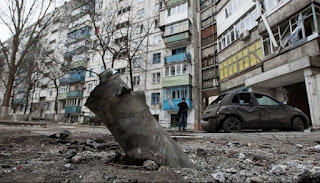 |
Apartment building in Mariupol, ca. 2019.
|
We should certainly have learned during the last two-plus years of Covid drama and deception that things are not always what our unified press would have us think. Now we are asked to believe the reverberating story of unmitigated Russian aggression against an innocent and helpless Ukraine. Little to no background information appears in the mainstream media about the history of this conflict, about Ukraine's war against the separatists in the eastern part of their country who want to rejoin Russia (or at least get to speak their language and live a normal life), or President Zelensky's tactics since gaining office in a landslide three years ago.
Meanwhile, Zelensky issues impassioned pleas to the West for more arms and ever-tougher sanctions against their attacker.
Into this vacuum, the ever insightful and straight-talking Archbishop Carlo Maria Vigano has released his take on the conflict. It's long, fascinating, and fully footnoted. You can read it here. You'll be glad you did.
Allow me to provide a few highlights from the essay. First, Vigano provides a link to Zelensky's campaign spot when running for President of Ukraine. It shows his machine-gun (literally) approach to anyone in his government who was allied with a "corrupt" Russia. The fact that Zelensky was an actor and comedian cannot soften the horror of this ad: Campaign spot.
Apparently, his campaign strategy worked. In 2019 Zelensky won the presidency and promptly got to work. The Archbishop's essay tells us:
He [Zelensky] liquidated the ministers of the old guard, first of all the powerful
Minister of the Interior, [Arsen] Avakov. He rudely retired the
president of the Constitutional Court who was acting as a check on his
laws. He closed seven opposition TV channels. He arrested and accused of
treason Viktor Medvedcuk, a pro-Russian sympathizer but above all the
leader of the Platform of Opposition – For Life party, the second party of the Ukrainian Parliament after his Servant of the People party.
He is also placing on trial for treason former President Poroshenko,
who was suspicious of everyone except for those who got along with the
Russians or their friends. The mayor of Kiev, the popular former world
boxing champion Vitaly Klitchko, has already been subjected to several
searches and seizures. In short, Zelenskyy seems to want to make a clean
sweep of anyone who is not aligned with his politics (here).
Zelensky is a member of the mighty World Economic Forum (crafters of The Great Reset) and has admitted that one of his heroes is Justin Trudeau of Canada. (If you followed Mr.Trudeau's approach to "caring" for his population during the last two years, this will tell you a lot.) And last year, "on February 4, 2021, the Ukrainian president shut down seven television stations, including ZIK, Newsone and 112 Ukraine, all guilty of not supporting his government." They were accused of being "under malign Russian influence."
Vigano also discusses the Nazi organizations in Ukraine. Any country can be home to such extreme groups, but in Ukraine they are recognized by the government and tasked with assisting in military operations. This includes employing the brutal Azov Battalion, an extreme nationalist group that the U.S. Senate suspended our help in training, until the CIA overruled that decision and brought them to our own shores to learn to become even more effective at crushing their opposition.
The press has been reporting here in the U.S. that the Russians have been bombing Ukrainian cities mercilessly since February. Maybe that's true. But what are we to make of footage shot by French journalist Anne-Laure Bonnell back in 2017 in the Donbass region of Ukraine showing the grim remnants of residences bombed by the Ukrainian government, of families huddled underground, of grieving parents of murdered children? They are indistinguishable from today's images of blackened apartment buildings that the Russians are supposed to have incinerated. Watch the 2017 video here (in French).
And in a recent report from the ground, Ms. Bonnell attests pointedly that the destruction she was witnessing in Donbass was at the hand of the Ukrainian army rather than the Russian army. Watch here (in French).
So this war is very complex, and as in many wars, looks can be deceiving. Someone once said that in war, the first casualty is always the truth. May God help and comfort all the innocent people caught in the middle of this one, and bring the truth forward.




